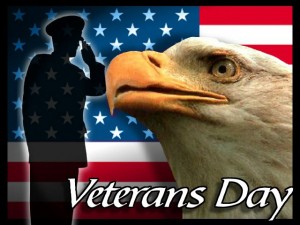Veterans Day 2011
This Friday, November 11, is Veterans Day. For numerologists, it’s doubly significant this year because it happens to be 11.11.11. November 11 used to be called Armistice Day because it was on this date in 1918 that an armistice to end World War I was signed in a railroad car in Compiegne, just outside of Paris. But the armistice that was signed that day would prove to make the numbers 11-11-11 unintentionally infamous for all time.
News of the ceasefire spread quickly by telegraph to all parts of the world. Italian opera singer Enrico Caruso got up early in New York City to celebrate and sang the American national anthem in English from his hotel balcony. Citizens in Windsor Locks ran along Main Street shouting, clanging pots and pans, and then burned Kaiser Wilhelm in effigy. Similar acts of celebration occurred throughout the country.
But the celebration was premature. The war had not really ended. It had about six hours to go, as the ceasefire was to begin at 11 a.m. on the 11th day of the 11th month — 11-11-11.The Allied signers of the armistice thought it would be more memorable if the peace began at 11. Little did they realize the horrible consequences their desire for numerical symmetry would have upon the lives of thousands of people.
Historian Joseph Persico has done extensive research about the final six hours of the Great War. Persico has found that more than 10.000 were killed, wounded, or missing on both sides during those last six hours. That’s more than the total casualties for both sides during the D-Day invasion during World War II!
American AEF Cmdr. Gen. John J. Pershing, who opposed the armistice, sent out an order to observe the ceasefire at 11 a.m. Pershing’s orders did not specify what to do between 5 a.m. and 11 a.m. Nine of the sixteen American divisional commanders, therefore, pressed on with their attacks against the Germans that morning. Seven commanders saw no point in putting their men’s lives at risk to take land that would be theirs to control in just a couple of hours and refused to engage the enemy.
U.S. troops begin their final pullout from Iraq at the end of this year, and the number of American troops in Afghanistan is scheduled to be reduced by 10.000 by then, too.
This is a good day to give thought to the sacrifices these men and women have made and the cause for which they made it.
Us. We’re the cause. Not the president, although he is the commander in chief. Not Congress. Just us.
We acknowledge that many combat troops tell interviewers that in battle, they are there for their buddies. That view certainly carries conviction in the middle of a battle, but it is also true that the soldiers and their buddies would not be in Afghanistan – would not have been in Iraq – except for threats, real or perceived, to their fellow Americans in general, not just the troops.
Nov. 11 is a traditional day for honoring American troops.
On this date 93 years ago, America and the world celebrated the first Armistice Day.
It was a solemn event that came to be observed annually, first as Armistice Day and later as Veterans Day.
At 11 seconds and 11 minutes past 11 o’clock on the 11th day of the 11th month of 1918, armistice between the hostile nations signaled the end of World War I. The Armistice actually was signed six hours earlier, at 5 a.m., but did not go into effect until the agreed time.
While originally it was an observance honoring those Americans who served in the trenches during World War I, after World War II it came to be a day of recognition for all veterans who had served their country, in peace time or war.
But as we have said before, the greatest honor and deepest regret is, of course, meant for those who have served in combat. And no one doubts that those who paid the ultimate price are worthy of the highest honors.
At least it’s not the Vietnam War.
But that doesn’t mean it’s all hearts and flowers waiting for the thousands of military service members pouring back home from Iraq, on what is expected to be the last Veterans Day of one of the longest military conflicts in the nation’s history.
Take former Army Staff Sergeant Josh Aguilar, for instance.
He mustered out in June, after 11 years of service that included three combat tours in Iraq, and the cold reality of civilian life has been splashing him ever since.
A sunny, determined sort who led his squads in everything from house-to-house patrols to firefights, the 31-year-old Aguilar expected that his leadership skills would quickly land him a job. But in months of banging on doors at everything from retail stores to auto companies, he has yet to get a nibble.
“I get plenty of thanks for my service, which is very nice – especially considering what the guys from the Vietnam era got coming home – but employers just don’t seem to be able to see how my military experience fits in for them,” Aguilar said at the tidy Hayward bungalow where he lives with his fiancee.
“What they look at is the fact that I don’t have a college degree” – he said. “I suppose they don’t really understand that I got a lot of leadership and management training in the Army that could be useful for them.”
He cracked a big smile through the dark beard he’s grown as a civilian. “Oh well” – he said. “The military taught us to adapt, and so that’s just what we have to do. After three combat deployments, I guess I could say I’m pretty resilient.”
